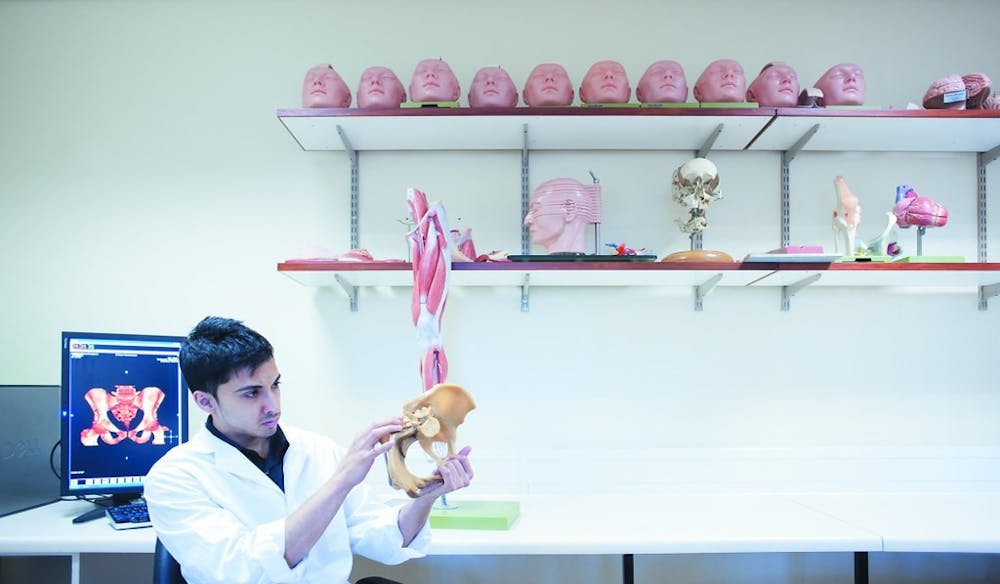
Over a year has passed since I started searching for students preparing to apply for medical school for Project MD 2027. It’s hard to believe that, when reconnecting with three of these students in the past month, all had already received their acceptances to medical school. While a year is still an awfully long time to wait, as a writer, it has felt like time flew by.
At this point in the application cycle, most successful applicants will have received acceptances from schools or are placed on a waitlist. In the most recent application cycle, our data shows that about 41% of students who applied nationally ended up matriculating at a medical school. The remaining 59% likely did not receive an admission offer or chose not to enroll for other reasons.
For the final Project MD column, I chose to reconnect with three applicants I had spoken with earlier in the application cycle: senior Siena Defazio; Shihua Chen, a research assistant at the School of Medicine; and Smrithi Upadhyayula, a senior at the University of Texas at Dallas. Defazio received an acceptance to the University of Alabama (a school she had confided to me was a dream school when we spoke a year ago), Upadhyayula is heading to the University of Texas Southwestern and Chen received an acceptance to medical school as well.
In an interview with The News-Letter, Chen noted that the application cycle was very stressful for her overall, especially because this was her second time applying.
“You almost feel like you want everything to be perfect, like, ‘This is my last chance,’” she said.
Now that the application cycle is over, Chen still feels that it is difficult for her to relax.
“Ultimately, at each step, it’s almost like a rat race. Right now, right after I got in I was like, ‘Oh, what do I need to do now to prepare to go to medical school and set myself up well for residency?’ It just feels like it never ends,” she said.
Despite her unease with the application process, Chen is glad that she learned from her first application attempts by asking the schools that rejected her for feedback. In addition to making her applications better, Chen was able to demonstrate her continued interest in schools through this action.
When DeFazio was applying, she was encouraged to refrain from mentioning any aspects of herself that might have been considered a liability in her application. However, in an interview with The News-Letter, she explained how she decided to eschew that advice and be true to herself.
“I feel like my life experience was very unique, and I want to talk about my life experience,” she said. “That also meant that the school I got accepted to really wanted me for who I was and not the person I was trying to act like to make myself more palatable.”
DeFazio wishes she had been more mindful about her school list when applying. Upadhyayula echoed these concerns as she applied to nearly fifty schools, but she also noted that it was difficult to know how much was too much.
“That’s easy to say in hindsight, knowing that I got in. An overabundance of caution isn’t the worst mistake!” Upadhyayula wrote in an email to The News-Letter.
According to Defazio, once she received her acceptance, the reality of being a doctor finally began to set in. Last year, Defazio told me about her dream of opening a community clinic where patrons could receive care for all aspects of their health.
While she still has lofty ambitions, Defazio began to realize that many doctors do not get the opportunity to build close relationships with their patients simply because of the way the medical system is designed. Nevertheless, she’s still committed to accomplishing her goals.
“The system isn’t designed for this, but I can create a system where this is feasible, where I can still have very deep relationships with my patients. It’s just going to be an uphill battle, but a medical degree is not against that,” Defazio said.
All three applicants also shared their thoughts on how the application process could be improved.
DeFazio did not have major suggestions for the application itself, expressing that she liked how the open-ended questions gave applicants an opportunity to reflect on their experiences. However, she felt that some schools could admit a more diverse class from the applicant pool.
“Generally, schools want to select for somebody that matches their existing profile because they want to maintain that culture,” she said.
Upadhyayula highlighted that school-to-school differences in requirements or assessments could be onerous to pre-med students and recommended that they be better standardized. While most medical school applicants are familiar with the Medical Colleges Admission Test (MCAT), applicants may also be asked to take the CASPer test, which evaluates situational judgment, or the AAMC PREview, which evaluates professional readiness.
Moreover, Chen asserted that the burden should not be on applicants to send in their application materials and secondaries as soon as possible due to rolling admissions. According to her, some schools might not reply or give updates to applications for months.
“There’s kind of this unrealistic expectation put on applicants to perform to a certain level, and they call it professionalism, but I think medical schools don’t necessarily hold themselves to the same standard,” she said.
Ellie Rose Mattoon is a junior from Austin, Texas majoring in Molecular and Cellular Biology and Public Health. Project MD 2027 documents the challenges, inequities and triumphs of Hopkins students applying to medical school for entry in 2023.





